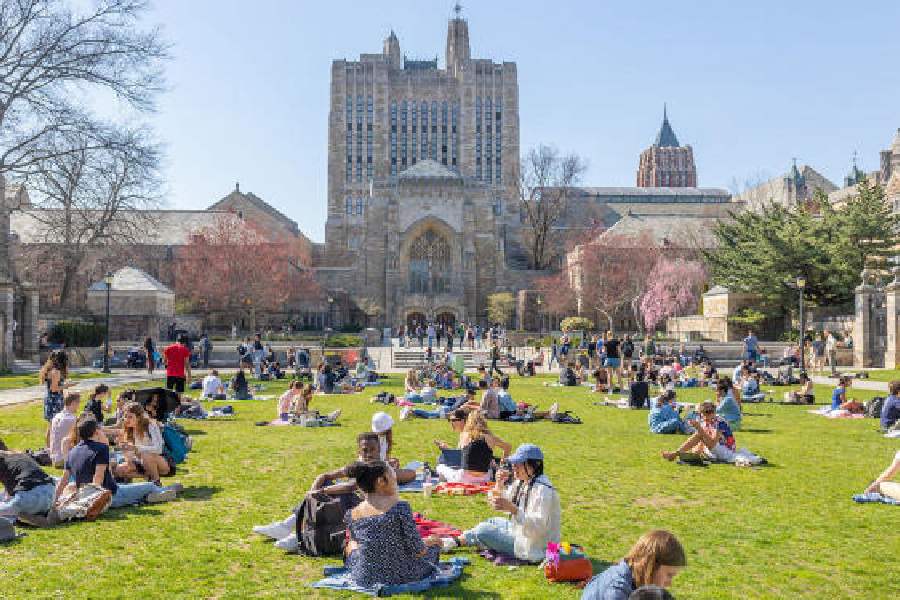In the weeks after Rachael Shaw-Rosenbaum, a first-year student at Yale, died by suicide in 2021, a group of strangers began convening on Zoom.
Some of them knew Shaw-Rosenbaum. But many only knew what she had been going through, as she struggled with suicidal thoughts and weighed the consequences of checking herself into a hospital.
One, a physician in her early 40s, had been told years before to withdraw from Yale while she was hospitalised after a suicide attempt, an experience she recalls as chillingly impersonal, “like you’re being processed through this big machine”. Another, a classical pianist in his 20s, withdrew from Yale amid episodes of hypomania and depression, feeling, as he put it, “not just excluded but rejected and cut off and forgotten about”.
Members of the group, which took the name Elis for Rachael, shared a complaint that Yale’s strict policies on mental health leaves — requiring students to withdraw without a guarantee of readmission, stripping them of health insurance and excluding them from campus — had penalised students at their most vulnerable moments.
“We discovered that there were just generations of Yalies who had had similar issues, who had kept quiet about it for decades and decades,” said Dr Alicia Floyd, the physician, one of the group’s founders. “And we all felt like something needed to change.”
The organising that began that day culminated last month in a legal settlement that considerably eased the process of taking a medical leave of absence at Yale.
Under the new policy, students will have the option to extend their insurance coverage for a year. They will no longer be banned from campus spaces or lose their campus jobs. Returning from leave will be simpler, with weight given to the opinion of the student’s health care provider.
Most striking, Yale has agreed to offer part-time study as an accommodation for students in some medical emergencies, a step it had resisted.
“My hope is that the changes that have emerged from these discussions will make it easier for students to ask for support, focus on their health and well-being and take time off if they wish, knowing that they can resume their studies when they are ready,” Pericles Lewis, the dean of Yale College, said in a message.
Yale declined to comment beyond the statement from Lewis.
Yale’s withdrawal policies were the subject of a Washington Post investigation in November 2022. The same month, Elis for Rachael filed a class-action lawsuit accusing the university of discriminating against students with disabilities.
Yale is not the only elite university to face legal challenges over its mental health policies. The department of justice has investigated Brown and Princeton over their handling of withdrawals, and Stanford faced a similar class-action lawsuit in 2019.
By offering part-time study as an accommodation, Yale has provided relief beyond what Stanford did, said Monica Porter Gilbert, an attorney at the Bazelon Center for Mental Health Law who represented plaintiffs in both cases.
“It’s the students and the plaintiffs in this case making their voices heard and bringing Yale to the table to have difficult conversations,” she said. The pandemic years, she added, have brought new urgency to their arguments. “As a nation, we talk about mental health differently now.”
Alicia Abramson, a Yale senior who is one of the two student plaintiffs in the class-action lawsuit, said Yale’s response was swifter and more comprehensive than she had expected. “It’s hopeful, in the sense that maybe they are finally taking this thing seriously,” she said.
She has no plans to abandon her advocacy work anytime soon, though. “I’m certainly hesitant to give Yale infinite praise,” she said. “You know, we had to sue them, right?”
As she struggled with suicidal thoughts in the second half of her first year at Yale, Shaw-Rosenbaum worried she would be forced to withdraw, jeopardizing the scholarships she needed to stay at Yale, said Zack Dugue, her boyfriend.
She had already been hospitalised once, in her first semester. “Basically, if I go to the hospital again, I will not be able to resume college and will lose the opportunity I had to learn at an extremely competitive university,” she wrote in a post on Reddit a few days before she died.
Growing up in Anchorage, Alaska, Shaw-Rosenbaum had been a debate champion. She dreamed of following her idol, Ruth Bader Ginsburg, to the Supreme Court.
Dugue, who met her at a scholarship event the spring of their senior year of high school, described her as “a tiny firebrand” and “super-duper kind”. She was still very young: Dugue was the first boy she ever kissed, her mother said.
She was not from a wealthy family; at home, she had at one time received health care through Medicaid. Withdrawing would mean losing not just her sense of belonging, but her Yale health insurance, a prospect Dugue said she found “apocalyptic.” “She also would have lost access to the very care she needed,” he said. “That was like a terrible tightrope to walk.”
For decades, students had criticized Yale’s withdrawal and readmission policies, which were deemed among the least supportive in the Ivy League in a 2018 white paper by the Ruderman Family Foundation. In 2015, a sophomore math major named Luchang Wang died by suicide after posting a desperate message on Facebook, saying she “couldn’t bear the thought of having to leave for a full year, or of leaving and never being readmitted”.
“Yale was a case where they were being very strict, and people would have to apply multiple times,” said Marcus Hotaling, president of the Association for University and College Counseling Center Directors and director of counselling at Union College in Schenectady, New York.










